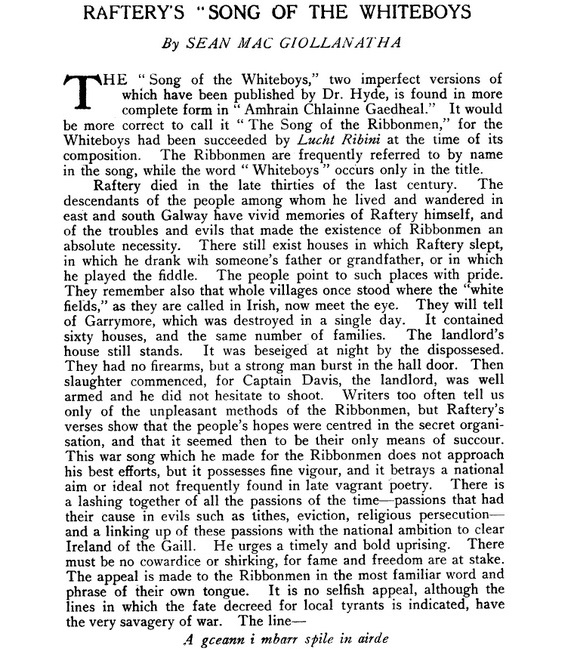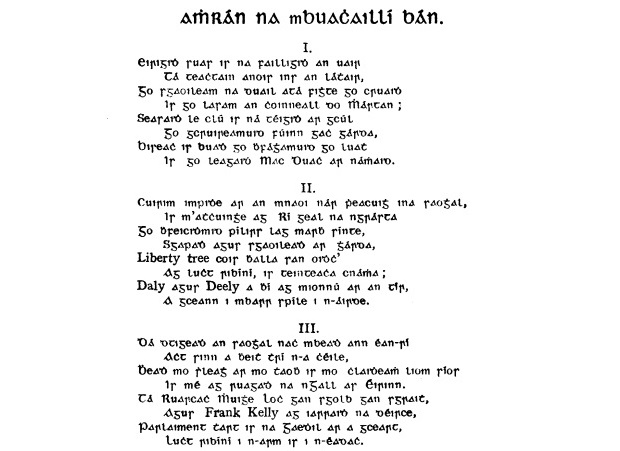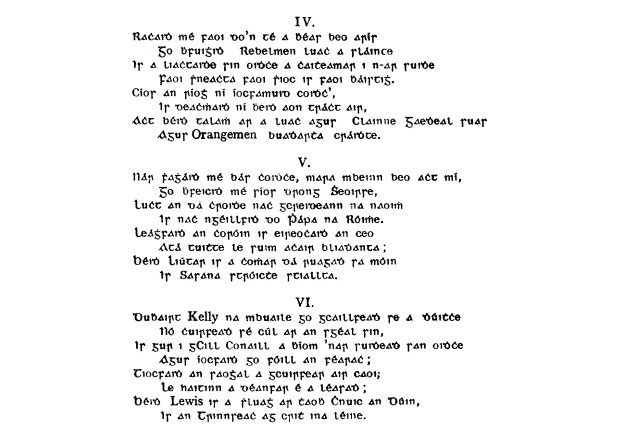Life
| 1779-1835 [Antoine Ó Reachtabhra; vars. Antoine Raiftearaí and Antaine Raifteirí; occas. Anthony Raftery]; b. [Lios Ard] Killeden, Kiltimagh, Co. Mayo, c.1784; blinded by smallpox in infancy [or at nine]; patronised by Taaffe family, afterwards severing relations with them; became a travelling bard known as ‘Kiltimagh Fiddler’; passed most of his time in the Gort-Loughrea district of Co. Galway; wrote on contemporary events such as Daniel O’Connell’s Clare election victory and the hanging of Whiteboy Anthony O’Daly; |
| best-known for “Mise Raifteirí File”, “Contae Mhaigh Eo”, and “Anuach Cuain” - a lament for those drowned there; also “Seanchas na Sceithe” [var. Sceiche], a metrical history of Ireland; his , “Na Buachaillí Bána” concerns the hanging of 1978 rebels by Denis Browne, High Sheriff of Mayo - known as ‘Denis the Rope’ of whom AR says he would like to ‘stick a spear through his enormous stomach’; Raftery died on Christmas Eve 1835; bur. at Rahasane, nr. Craughwell, Co. Galway, where Lady Gregory, with Douglas Hyde and Edward Martyn, later erected a gravestone; |
| he is the object of stories by Yeats - notably in “Dust hath close Helen’s Eyes” (Celtic Twilight, 1902) and a biographical novel by Donn Byrne (Blind Raftery, 1924); his poems were edited from Douglas Hyde from RIA manuscripts [var. oral trad.] (Abhráin agus Dánta an Reachtahbhraigh, 1903, erv. 1933), and latterly by Ciarán Ó Coigligh (Raiftearaí: Amhráin agus Dánta, 1987);there are modern doubts as to his authorship of his best-known poem, “Mise Raiftearaí, an file ...” - the first four lines of which appeared on the Irish five-pound note (Series C). DIB DIW DIH FDA OCILb |
| Note: The Dictionary of Irish Biography (RIA 2009) on Raftery entry by Ciarán Ó Coigligh ascribes the birth-date of 1799 - online. |
[ top ]
Works
|
[ top ]
Criticism| Writers of the Literary Revival |
|
| Modern studies |
|
[ top ]
Seán Mac Giollanátha [?pseud], in The Irish Review, 3, 29 (July 1013), pp.245-47.
| ‘Raftery’s “Song of the Whiteboys” by SEAN MAC GIOLLANATHA |
|
“The Song of the Whiteboys”, two imperfect version of which have been published by Dr. Hyde is found in more complete form in Amhrain Chlainne Gaedheal. It would be more correct to call it The song of the Ribbonmen, for the Whiteboys had been succeeded by Lucht Ribini at the time of its composition. The Ribbonmen are frequently referred to by the name in the song, while the word ‘Whiteboys’ occurs only in the title. a gceann i mbar pile in airde ... is more graphic than any life I can remember either in English or Irish. Taxes and tithes must cease. Land must be let at its value. The Gael will raise his head and Orangemen will growl beneath the new regime. In the midst of this passionate appeal to the Ribbonmen to be men, to face the multiplicity of terrors and tortures that threaten to destroy them, Raftery pauses and reflects for an instant. Through the smoke of the burning cabins, as it were, he sees Ireland. He, too, is a Gael with as good a right to bear arms for Ireland as any. He is not th epoet of a creed or of a faction by choice. He wants also to sing for that women whose face peers through the smoke of the clearings. She is not forgotten. If every equality come and he be enfranchised and given th eright to bear arms, then Beigh no shleagh ar mo thaobh is mo claidheamh liom sios |
| (p.245.) |
 |
| [ Click image to access JSTOR preview page - online. A full version can be downloaded at PhDTree - online; accessed 16.10.2014.] |
| [ See full poem under Quotations - infra. ] |
| Note: Bibliographical index for An Claidheamh Soluis with Fáinne an Lae (1889-1932) lists various contribs. by Seán Mac Giollanátha - viz: Medical Officers in the Gaeltacht (Feabhra 28, 1914); Rebirth: Cúrsai Polaitíochta again Conradh na Gael (Lúnasa 1, 1914); Be Ready: Éire agus an Cogadh Domhanda (Lúnasa 8, 1914); also An Foghadh Fealltach (6.9.1913); Irish Ireland and the CRISIS (15.8.1914). |
| See PDF listing at Maynooth University (NUI) - EPrints - online. |
[ top ]
| “Mise Raiftearaí, an file ...” | ||
|
||
| Some translations ... | ||
| Lady Gregory | ||
| ‘I am Raftery the poet, / Full of hope and love; / My eyes without light, / My gentleness without misery. / Going west on my journey / With the light of my heart; / Weak and tied to the end of my road. / I am now, and my back to the wall, / Playing music to empty pockets.’ (“His Answer to Some Stranger Asked Who He Was”.’) | ||
| Douglas Hyde | ||
| ‘I am Raftery the poet, / Full of hope and love, / With eyes that have no light, / With gentleness that has no miser. // Going west upon my pilgrimage / by the light of my heart / Feeble and tired, / To the end of my road. // Behold me now, / And my face to a wall, / A-playing music / Unto empty pockets.’ | ||
| Frank O’Connor | ||
| ‘I am Raftery the poet, / Full of hope and love, / With sightless eyes / And undistracted calm. // Going west on my journey / By the light of my heart, / Weak and tired / To the end of my road. // Look at me now! / My face to the wall, / Playing music / To empty pockets.’ | ||
| Desmond O’Grady | ||
| ‘I’m Raftery the poet. / My eyes stare blind / I’ve known love, still hold hope, / live in peace of mind. // Weary and worn / I walk my way / by the light of my heart / to my death’s marked day. // Look at me now, / with my face to the wall, / playing for people / who have nothing at all.’ |
[ top ]
| Verses on the Protestant Reformation |
Fág uaim do eaglais ghalla |
| Trans. unknown; posted on Facebook by Neil Patrick Doherty, 14.10.2018. |
[ top ]
Má fhaighimse sláinte is fada bheidh trácht A Rí na nGrást a cheap neamh is párthas, Nár mhór an t-íonadh ós comhair na ndaoine Bhí buachaillí óg ann tíocht an fhómhair, |
If my health is spared I’ll be long relating, King of Graces, who died to save us, What wild despair was on all the faces And boys there lying when crops were ripening, |
[ top ]
"Cill Aodáin"Anois teacht an earraigh Ó chuir mé i mo cheann é I gClár Chlainne Mhuiris Go Coillte Mách rachaidh |
Now coming of the Spring Since I put it into my head In Claremorris’ family To Kiltimagh (Magh’s Woods) I shall go |
[ top ]
| “Song of the Whiteboys” by Raftery - given in Seán Mac Giollanátha [?pseud], in The Irish Review, 3, 29 (July 1013), pp.245-47. |
 |
 |
|
—From PhDTree - online; accessed 26.10.2014; see Seán Mac Giollanátha under Commentary - supra. |
[ top ]
References
Seamus Deane, gen. ed., The Field Day Anthology of Irish Writing (Derry: Field Day 1991), Vol. 2; selects ‘Mise Raifteri’, ‘Cill Liadáin’ [var. ‘Condae Mhuigheó’, ‘Máire Ní Eidhin’; when Douglas Hyde discovered some poems of Raftery in MSS at the RIA, Lady Gregory found 22 more in another MS; Hyde issued his first edition of Raftery in 1903, and another in 1933; ‘Mise Raifteri’ may not actually be by Raftery himself, [723-38], 787, BIOG: Antoine Raftery [Raifteri], b. Lios Ard, Co. Mayo, probably 1784; some education at hedge-school; blinded by smallpox at nine; encouraged by his landlord, the Taaffes, till disagreement with them, and afterwards became wandering minstrel in South Galway area; died Christmas Eve 1835; stories about him collected by Lady Gregory and Douglas Hyde; along with Edward Martyn, they erected a stone on his grave at Killeenin nr. Craughwell, Co. Galway; Yeats also attracted to legend of Raftery. Vol. 3, see pp.1309-10 [Declan Kiberd calls him the nineteenth century writer and cult figure, p.1312]; also pp.1359, 1282-83.
[ top ]
University of Ulster Library, Morris Collection, holds Abhrain agus Danta ... (1933); Abhrain atá Leaghta ... (1903). Blind Raftery. Abhráin atá Leagtha ar an Reachtúire, ed. of poems by Douglas Hyde (Dublin 1903, rep. with add. 1933, 1969).
[ top ]
Notes
Daniel O’Connell: Raftery wrote a poem entitled “Bua Uí Chonaill [‘O’Connell’s Victory’]” arising from the Clare election of 1828 [see under Daniel O’Connell, q.v.].
Douglas Hyde, in his edn. of Songs Ascribed to Raftery, ‘[...] gives an account of first hearing “The County Mayo” being sung by an old man at the door of his cottage while himself on a shooting expedition one fine frosty morning. “[will] you learn me that song?”, he asked. “That was my first meeting with the wave that Raftery left behind him.”’ (Dominic Daly, The Young Douglas Hyde, 1974, p.29.)
[ top ]
W. B. Yeats: In “The Curse of Cromwell”, Yeats echoes Ó Rathaille’s best know poem “Gile na Giolla”: ‘You ask what - I have found, and far and wide I go: / Nothing but Cromwell’s house and Cromwell’s murderous crew ... // And there is an old beggar wandering in his pride - / His fathers served their fathers before Christ was crucified.’ See also translations anthologised in John Montague, ed., New Oxford Book of Irish Verse (OUP 1986), pp.195-199 [‘Brightness most bright I beheld on the way, forlorn’; ‘The drenching night drags on’; The Vision; Valentine Browne; ‘No help I’ll call’).
[ top ]
J. M. Synge: Declan Kiberd suggests that Synge read widely in the poetry of Raftery and drew upon his life and work in his portrayal of the tramp, especially Christy Mahon in The Playboy of the Western World. (See Kiberd, Synge and the Irish Language, London: Macmillan 1979, p.139; quoted in Anne Gallagher, ‘Tramps, Tinkers and Beggars in the Plays of J. M. Synge’, UUC UG Diss., 2010.)
[ top ]
James Joyce makes an allusion to Raftery in the “Cyclops” episode of Ulysses: ‘the harsher and more personal note which is found in the satirical effusions of the famous Raftery ...’ (Ulysses, Bodley Head Edn., 1961, p.404).
[ top ]